Angela Ackerman's Blog: Writers Helping Writers, page 170
December 18, 2012
HELP THE ELF: I Found Santa's Missing Nice List!

Hi everyone! As you may remember, a few weeks ago PETE the Elf had a touch too much Eggnog at the Holiday Christmas Party and as he stumbled home, he lost Santa's NICE LIST.
The North Wind scattered the papers to all four corners of the world, and as soon as Becca and I found out, we put out a call to our readers to help find them in order to SAVE CHRISTMAS.
Emails have poured in as writers across the globe began to find snippets of the NICE LIST stuck to the windshields of their parked cars, fluttering in hedges and caught among their garden gnome collections. And of course, no one wanted to let Pete down, so they took on the task of gifting these good folks themselves!
All over the Internet today, you'll see how the kindness of others helps to support, offer strength and push us to reach higher and farther than we ever could alone. I hope you'll visit some of the HELP THE ELF blogs found in the list HERE and send some seasonal wishes to the people who make up this great community of ours.
Oh, and I almost forgot! Becca and I both found part of Santa's missing NICE LIST, too! Becca found hers stuck between the slats of a lounge chair down in Florida, and I discovered mine caught in the pine bough decorating my front door in Calgary, Alberta! And shock of all shocks, we recognized the names. Check this out:
Becca's found this one:

NAME: Donna Gephart
LOCATION: Wild About Words
NICE LEVEL: 98%
NAUGHTY LEVEL: 2%
OBSERVATIONS: Donna is a tireless advocate for children, a super-talented writer, and an energetic cheerleader for anyone needing encouragement. She co-leads my face-to-face writing group, always offering solid advice and honest support. Donna's one of those people who make you feel like a better person just for knowing her. I'm so glad to be able to call her a friend.
RECOMMENDATION: a) Coal b) Gift
Because poor Pete is dashing all over the place trying to hunt down the
rest of Santa's missing Nice List, I decided to take care of this one
myself. Donna, knowing your devotion to promoting literacy (and your general selflessness), I've made a donation in your name to Sheltering Books, Inc, a non-profit organization that donates children's books to homeless shelters, domestic violence shelters, and residential treatment centers around the country. Because of your kindness, a few more books will make it into the hands of kids in the very near future.
~ ~ * ~ ~
And I found this one:

NAME:
Carol Riggs
LOCATION: Artzcarol Ramblings
NICE LEVEL: 97%
NAUGHTY LEVEL: 3%
OBSERVATIONS: Carol had many life challenges this year but faced the world with optimism and hope. Her energy and encouragement is appreciated by many and she gave a lot of her time to other writers, critiquing and showing support. There was that one issue where her TBR pile got out of hand, but this appears to be common theme with writers.
RECOMMENDATION: a) Coal b) Gift
~ ~ * ~ ~
Taking my lead from Becca who got a frantic call from Pete about how worried he was he might not get to all the presents in time, I decided to take care of this one myself. Carol, I have watched how you have kept spirits up all this year through the challenges and how good you make others feel. Enjoy Angela Townsend's YA book, AMAROK, and have a wonderful Christmas!
Photo Credit: assorted gold baubles (christmasstockimages.com) / CC BY 3.0
How about you, Musers? Is there someone you'd like to wish a Merry Christmas to, or tell them how much they mean to you? JOIN US! There's plenty of days left until Christmas, and sometimes kind words can lift people up in a way that they really need. Why not send someone an ecard or note, and spread some kindness and cheer!

Published on December 18, 2012 21:30
December 16, 2012
Physical Attributes Entry: Noses

Physical description of a character can be difficult to convey—too much will slow the pace or feel 'list-like', while too little will not allow readers to form a clear mental image. If a reader cannot imagine what your character looks like, they may have trouble connecting with them on a personal level, or caring about their plight.
One way to balance the showing and telling of physical description is to showcase a few details that really help 'tell the story' about who your character is and what they've been through up to this point. Think about what makes them different and interesting. Can a unique feature, clothing choice or way they carry themselves help to hint at their personality? Also, consider how they move their body. Using movement will naturally show a character's physical characteristics, keep the pace flowing and help to convey their emotions.
NOSES
Descriptors: large, small, bulbous, aquiline, Grecian, spreading, squashed, bumpy, humped, crooked, broken, bloody, straight, hooked, pert, button, flat, freckled, veined, sun-spotted, pink/red, dripping, sniffling, sniffing, twitching, honking, wrinkled, crinkled, stopped-up, snotty, congested, germy, frostbitten, sunburned, peeling
Noises Noses Make: sniffle, snuffle, sniff, whistle, huff, wheeze, snore, snort, blow, honk, gurgle, puff, inhale, exhale
Key Emotions and Related Nose Gestures:
When someone is feeling defensive, smug, or proud, the nose will lift, along with the head, shoulders, and overall bearing. It also lifts when a smell is detected. Noses run when people cry, giving the voice a stopped-up, nasal quality to indicate sadness. Disgust or contempt is displayed by a wrinkling of the nose, while a flaring of the nostrils is a good sign that someone is angry. People will often scratch or rub their nose when they're feeling nervous or uneasy. Also, people frequently touch their noses when they're being dishonest.
Simile and Metaphor Help:
He blew into a hanky, sounding like an out-of-tune trumpet.
She pinched her ski-slope nose, trying to flatten the upturned launch at its end.
Clichés to Avoid : someone looking down their nose at you; big noses being compared to Pinocchio's or Cyrano de Bergerac's; having a nose like a hawk; the cute little button nose
HINT: When describing any part of the body, try to use cues that show the reader more than just a physical description. Make your descriptions do double duty. Example (in honor of the long-awaited Hobbit movie):
Round the corner came a black horse, no hobbit-pony but a full-sized horse; and on it sat a large man, who seemed to crouch in the saddle, wrapped in a great black hood and cloak, so that only his boots in the high stirrups showed below; his face was shadowed and invisible.
When it reached the tree and was level with Frodo, the horse stopped. The riding figure sat quite still with its head bowed, as if listening. From inside the hook came a noise as of someone sniffling to catch an elusive scent.
I like this example because there's no real description of any physical features. Tolkien only uses the Black Rider's crouched posture and its nose to underscore the creature's evil.
BONUS TIP: The Colors, Textures & Shapes Thesaurus in our sidebar might help you find a fresh take on some of the descriptors listed above!

Published on December 16, 2012 10:09
December 14, 2012
Quinn’s Cookie Exchange
Becca and I are joining in on a fun event to celebrate Angela Felsted's release of her YA Contemporary,
Chaste
 . Instead of the usual blog splash type launch event, Angela is tapping into the holiday spirit and forming a cookie exchange. Why cookies? Because Quinn, the teenage main character in Chaste, knows his way around a kitchen!
. Instead of the usual blog splash type launch event, Angela is tapping into the holiday spirit and forming a cookie exchange. Why cookies? Because Quinn, the teenage main character in Chaste, knows his way around a kitchen!

Clara @Wikimedia Commons
Hey, I love cookies. Becca loves cookies. And, we're willing to bet you guys love cookies too! So, here is a favorite cookie recipe from both Becca and myself. Enjoy!
Angela's recipe:
Cranberry Pistachio Biscotti
INGREDIENTS:
1/4 cup butter
3/4 cup white sugar
2 teaspoons vanilla extract
1/2 teaspoon almond extract
2 eggs
1 3/4 cups all-purpose flour
1/4 teaspoon salt
1 teaspoon baking powder
1/2 cup dried cranberries
& 1 1/2 cups pistachio nuts
DIRECTIONS: Preheat the oven to 300 degrees F (150 degrees C). In a large bowl, mix together butter and sugar until well blended. Mix in the vanilla & almond extracts, then beat in the eggs. Combine flour, salt, and baking powder; gradually stir into egg mixture. Mix in cranberries and nuts by hand.
Divide dough in half & form two logs (12x2 inches) on a cookie sheet that has been lined with parchment paper. Dough may be sticky; wet hands with cool water to handle dough more easily. Bake for 35 minutes in the preheated oven, or until logs are light brown. Remove & set aside to cool for 10 minutes. Reduce oven heat to 275 degrees F (135 degrees C) and cut logs on diagonal into 3/4 inch thick slices. Lay on sides on parchment covered cookie sheet & bake 8 to 10 minutes, or until dry.
Becca's recipe:
White Chocolate-Strawberry Squares
INGREDIENTS:
1 stick (1/2 cup) butter
12 ounces white chocolate chips
2 large eggs
1/2 cup sugar
1 teaspoon almod extract
1 1/2 cups all-purpose flour
1 cup strawberry preserves or jam
1/3 cup slice almonds
foil
non-stick spray
DIRECTIONS:
1. Heat oven to 350 degrees. Line a 9-inch square pan with foil, letting the ends extend 2 inches over the edges on both sides. Coat with non-stick spray.
2. Melt butter and chocolate chips in a medium saucepan over low heat (mixture may look curdled).
3. Beat eggs and sugar in a large bowl until lemon-colored. Stir in white chip mixture and extract until combined, then the flour until blended. Remove and reserve 1/2 cup of the batter. Spread remaining batter in prepared pan.
4. Bake 20 minutes. Gently spread preserves evenly over crust. Spoon dollops of reserved batter over top. Sprinkle with almonds. Bake 30-35 minutes until lightly browned. Cool in pan on a wire rack. Then lift by foil ends to a cutting board and cut into squares.
Want to find out a bit more about Angela's book, Chaste ? Here's the blurb:
? Here's the blurb:
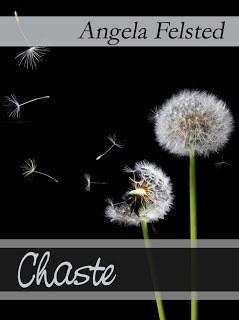
When he steps into his physics class on the first day of senior year, Quinn Walker is too exhausted from staying up all night with his three-month-old nephew to deal with moral dilemmas. As a devout Mormon who has vowed to wait until marriage for sex, the last thing he needs is a very hot and very sexy Katarina Jackson as his physics partner. Regrettably, he has no choice.
Kat feels invisible in her mansion of a home six months after losing her older brother in a fatal car crash and will do anything to get her parents’ attention. Since her pastor father has no love for Quinn’s “fake” religion and her ex-boyfriend refuses to leave her alone, she makes an impulsive bet with her friends to seduce her holier-than-thou lab partner by Christmas.
Oh, now that is a blurb! You can feel the tension and I love characters who are so far apart on the morality scale. I hope you enjoyed our cookie exchange, and kudos for Angela for thinking up something different for her book launch. We love it when creativity allows someone's book to stand out!
Do you have a family favorite cookie recipe? Let's get an exchange going--please post it below, or tell us about the best cookie you ever ate!

 . Instead of the usual blog splash type launch event, Angela is tapping into the holiday spirit and forming a cookie exchange. Why cookies? Because Quinn, the teenage main character in Chaste, knows his way around a kitchen!
. Instead of the usual blog splash type launch event, Angela is tapping into the holiday spirit and forming a cookie exchange. Why cookies? Because Quinn, the teenage main character in Chaste, knows his way around a kitchen!
Clara @Wikimedia Commons
Hey, I love cookies. Becca loves cookies. And, we're willing to bet you guys love cookies too! So, here is a favorite cookie recipe from both Becca and myself. Enjoy!
Angela's recipe:
Cranberry Pistachio Biscotti
INGREDIENTS:
1/4 cup butter
3/4 cup white sugar
2 teaspoons vanilla extract
1/2 teaspoon almond extract
2 eggs
1 3/4 cups all-purpose flour
1/4 teaspoon salt
1 teaspoon baking powder
1/2 cup dried cranberries
& 1 1/2 cups pistachio nuts
DIRECTIONS: Preheat the oven to 300 degrees F (150 degrees C). In a large bowl, mix together butter and sugar until well blended. Mix in the vanilla & almond extracts, then beat in the eggs. Combine flour, salt, and baking powder; gradually stir into egg mixture. Mix in cranberries and nuts by hand.
Divide dough in half & form two logs (12x2 inches) on a cookie sheet that has been lined with parchment paper. Dough may be sticky; wet hands with cool water to handle dough more easily. Bake for 35 minutes in the preheated oven, or until logs are light brown. Remove & set aside to cool for 10 minutes. Reduce oven heat to 275 degrees F (135 degrees C) and cut logs on diagonal into 3/4 inch thick slices. Lay on sides on parchment covered cookie sheet & bake 8 to 10 minutes, or until dry.
Becca's recipe:
White Chocolate-Strawberry Squares
INGREDIENTS:
1 stick (1/2 cup) butter
12 ounces white chocolate chips
2 large eggs
1/2 cup sugar
1 teaspoon almod extract
1 1/2 cups all-purpose flour
1 cup strawberry preserves or jam
1/3 cup slice almonds
foil
non-stick spray
DIRECTIONS:
1. Heat oven to 350 degrees. Line a 9-inch square pan with foil, letting the ends extend 2 inches over the edges on both sides. Coat with non-stick spray.
2. Melt butter and chocolate chips in a medium saucepan over low heat (mixture may look curdled).
3. Beat eggs and sugar in a large bowl until lemon-colored. Stir in white chip mixture and extract until combined, then the flour until blended. Remove and reserve 1/2 cup of the batter. Spread remaining batter in prepared pan.
4. Bake 20 minutes. Gently spread preserves evenly over crust. Spoon dollops of reserved batter over top. Sprinkle with almonds. Bake 30-35 minutes until lightly browned. Cool in pan on a wire rack. Then lift by foil ends to a cutting board and cut into squares.
Want to find out a bit more about Angela's book, Chaste
 ? Here's the blurb:
? Here's the blurb:
When he steps into his physics class on the first day of senior year, Quinn Walker is too exhausted from staying up all night with his three-month-old nephew to deal with moral dilemmas. As a devout Mormon who has vowed to wait until marriage for sex, the last thing he needs is a very hot and very sexy Katarina Jackson as his physics partner. Regrettably, he has no choice.
Kat feels invisible in her mansion of a home six months after losing her older brother in a fatal car crash and will do anything to get her parents’ attention. Since her pastor father has no love for Quinn’s “fake” religion and her ex-boyfriend refuses to leave her alone, she makes an impulsive bet with her friends to seduce her holier-than-thou lab partner by Christmas.
Oh, now that is a blurb! You can feel the tension and I love characters who are so far apart on the morality scale. I hope you enjoyed our cookie exchange, and kudos for Angela for thinking up something different for her book launch. We love it when creativity allows someone's book to stand out!
Do you have a family favorite cookie recipe? Let's get an exchange going--please post it below, or tell us about the best cookie you ever ate!

Published on December 14, 2012 00:00
December 11, 2012
Give LUV to Writing Partners with HELP THE ELF!
As you might remember, Pete the Elf had one too many eggnogs at the Santa’s Workshop Christmas Bash and as he wobbled home, he dropped Santa’s Nice List! Then of course, the North wind blew in and scattered pieces of the list to the four corners of the earth!
And if Santa finds out...whoo, boy.

Look at Pete. Such a derpy little fellow, isn't he? The poor guy needs some help finding his list! After the whole "Grandma Got Run Over By A Reindeer" thing, it's pretty clear Santa has road rage issues, so you can only imagine the fireworks if we don't find this list in time.
Now I don't know about you, but I know PLENTY of helpful, kind folks in the Writing Community. In fact, I wouldn't be at all surprised to find out if some of them were on the missing Nice List. Maybe YOU can think of someone, like a critique partner or a writing buddy, who has supported you all year long. And maybe, just maybe, YOU might want to help Pete out and do something nice for them on December 19th.
If you would like to find out more about OPERATION: HELP THE ELF! the original post is HERE and if you fill out this FORM I can email you some more details. If it sounds like your thing, we would LOVE your help to spread some seasonal kindness & cheer!
Also, some BIG NEWS!
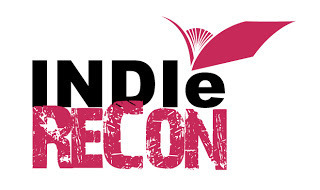
A small group of indie writers has pulled together and is hosting a FREE online conference on everything INDIE in Feb 2013!
Welcome to the first INDIE ReCon - Make Indie Publishing a Mission Possible
Are you curious about Indie publishing, but don't know where to start? Or, are you already a published Indie author looking to boost your sales or expand your reach? Then you'll want to attend a new exciting online conference happening in 2013 - INDIE Revolution Conference. Or as we like to call it, INDIE ReCon.
INDIE ReCon is happening online from February 12-14, 2013.
INDIE ReCon is a FREE, ONLINE conference that is modeled after the awesome annual WriteOnCon. It is designed to help any writer or author who is curious about the ins and outs of Indie publishing.
We will feature over 30 guests that include industry experts as well as some of the bestselling adult and young adult authors in the publishing industry today including: Bob Mayer, Hugh Howey, M. Leighton, and Samantha Young (just to name a few).
For three days, INDIE ReCon will highlight new topics every hour (sometimes every half hour) for 8 hours a day which will include interviews, blog posts, vlogs, and live online chats. You'll receive advice from authors, bloggers, marketing partners, cover designers, editors, and more. You can check out our line up of topics and guests on our website.
~ ~ * ~ ~
Becca and I will be participating in IndieReCon as well, discussing Creative Book Launches That Command Attention. Hope to see you all there!
ALSO, if you'd like a bit of further reading today, I'm posting over at author Luke Reynolds' blog, Intersections, talking about how KINDNESS fits into my personal life mission. I hope you'll swing by!

And if Santa finds out...whoo, boy.

Look at Pete. Such a derpy little fellow, isn't he? The poor guy needs some help finding his list! After the whole "Grandma Got Run Over By A Reindeer" thing, it's pretty clear Santa has road rage issues, so you can only imagine the fireworks if we don't find this list in time.
Now I don't know about you, but I know PLENTY of helpful, kind folks in the Writing Community. In fact, I wouldn't be at all surprised to find out if some of them were on the missing Nice List. Maybe YOU can think of someone, like a critique partner or a writing buddy, who has supported you all year long. And maybe, just maybe, YOU might want to help Pete out and do something nice for them on December 19th.
If you would like to find out more about OPERATION: HELP THE ELF! the original post is HERE and if you fill out this FORM I can email you some more details. If it sounds like your thing, we would LOVE your help to spread some seasonal kindness & cheer!
Also, some BIG NEWS!

A small group of indie writers has pulled together and is hosting a FREE online conference on everything INDIE in Feb 2013!
Welcome to the first INDIE ReCon - Make Indie Publishing a Mission Possible
Are you curious about Indie publishing, but don't know where to start? Or, are you already a published Indie author looking to boost your sales or expand your reach? Then you'll want to attend a new exciting online conference happening in 2013 - INDIE Revolution Conference. Or as we like to call it, INDIE ReCon.
INDIE ReCon is happening online from February 12-14, 2013.
INDIE ReCon is a FREE, ONLINE conference that is modeled after the awesome annual WriteOnCon. It is designed to help any writer or author who is curious about the ins and outs of Indie publishing.
We will feature over 30 guests that include industry experts as well as some of the bestselling adult and young adult authors in the publishing industry today including: Bob Mayer, Hugh Howey, M. Leighton, and Samantha Young (just to name a few).
For three days, INDIE ReCon will highlight new topics every hour (sometimes every half hour) for 8 hours a day which will include interviews, blog posts, vlogs, and live online chats. You'll receive advice from authors, bloggers, marketing partners, cover designers, editors, and more. You can check out our line up of topics and guests on our website.
~ ~ * ~ ~
Becca and I will be participating in IndieReCon as well, discussing Creative Book Launches That Command Attention. Hope to see you all there!
ALSO, if you'd like a bit of further reading today, I'm posting over at author Luke Reynolds' blog, Intersections, talking about how KINDNESS fits into my personal life mission. I hope you'll swing by!

Published on December 11, 2012 03:00
December 9, 2012
HAPPY BIRTHDAY BECCA!
Hi Everyone! Guess what?
Today is Becca's birthday!
She probably wanted to keep it quiet and all, but that's not how I roll. So please, stalk her down on Facebook, Twitter and Goodreads and send her some happy wishes for today.
Becca, I feel like I hit the lottery the day we met! Here's to many more birthdays, books & great times here at The Bookshelf Muse!


Today is Becca's birthday!
She probably wanted to keep it quiet and all, but that's not how I roll. So please, stalk her down on Facebook, Twitter and Goodreads and send her some happy wishes for today.
Becca, I feel like I hit the lottery the day we met! Here's to many more birthdays, books & great times here at The Bookshelf Muse!

Published on December 09, 2012 09:39
December 7, 2012
Using My Fears in Writing, by Laura Pauling
I've got TWO exciting somethings for you all today. First off, I just recently discovered an awesome resource: the Alliance of Independent Authors (ALLi), an organization dedicated to promoting, supporting, advocating for and advancing the interests of independent, self-publishing authors. Their blog is just stuffed with helpful information for anyone interested in indie publishing and I'm contributing today with a post on
Conveying Emotion Effectively via The Emotion Thesaurus
. I'd love for you to stop by and see what nuggets you can glean at their blog.
Secondly, and even MORE amazing: we're Stop #5 on Laura Pauling's blog tour for her new release! She's here today to tell you a little bit about her book and how she was able to use her fear while writing it. Oh, and she's got some tasty tidbits up for grabs so don't forget to sign up to win one of her awesome prize packages!
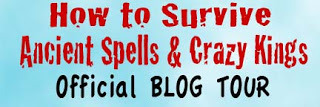
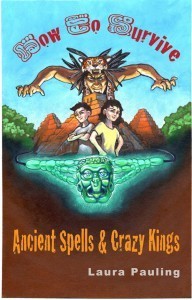
When Bianca and Melvin brave the jungle to rescue their grandfather, they stumble upon the ancient Maya city of Etza, where the people haven’t aged in 2,000 years. They must learn to work together as they face loincloth-wearing skeletons from the underworld, a backstabbing princess, and an ancient prophecy that says in three days the city will be destroyed.
No problem. They’ll find Zeb and zip right out of there. The fact that a crazy king wants to serve Bianca up to the gods as an appetizer is just a minor technicality. But this ancient evil dude has finally met his match.
Using my fears in my writing
We are often told to write what we know. One problem. I’ve never lived with the Ancient Maya and I’ve never visited the temples. I’d love to! Believe me. But I had to rely on research and others’ first hand experiences.
But I did use fear in this story.
When Bianca, the main character, faces the stone of sacrifice and the king who wants to offer her up to the gods, I channeled my fear of squirrels and hornets. Sounds silly but it worked.
Yes, I’m the girl who screams and jerks and runs away at the sight of the brown insects with hanging legs and a buzz that strikes terror in my heart.
Last year, my family was gone. I was home alone and it happened to be the first really warm spring day. So, of course, as usual, a hornet buzzed up in the sky light in my bedroom.
I was by myself. And I had to take care of it because no way would I be able to sleep at night.
I’d like to say that I was brave and killed it with the end of a broomstick like my husband does, but no, I came out with the big guns. Raid. I know. Bad. Chemicals. Emergencies only!
I hovered by the entrance to my room, Raid in hand. The buzzing was constant. I had to do this. But seriously. My legs were shaking. And I realized that shaking legs in extreme fear is not a cliché. It’s very real. I could barely breathe. Sweat broke out all over my body.
I sprayed and down it fell. Except there was more angry buzzing! Meaning there was one half alive on the floor and another one in the window. Two! I started crying because it wasn’t over.
I sprayed the second and smashed them both. Then I crashed, my body weak from the adrenaline rush.
So when I had to write about Bianca facing death, I used my experiences. Okay, I agree. Facing death by having your heart ripped out is not the same as killing two hornets. But it felt like it to me!
Thanks Angela and Becca for having me today!
How To Survive Ancient Spells and Crazy Kings released in November. Pugalicious Press did a fantastic job, and I’m extremely happy with the results. This book would make a fantastic gift for boys or girls who enjoy adventure stories with lots of excitement! You can purchase it on Amazon or Barnes and Noble. You can read the first chapter here.
Thankfully, my journey is just beginning and I’m excited to see where it leads.
Click here for the list of blog tour stops! Enter to win these prize packages!
Prize Package One (signed paperbacks)
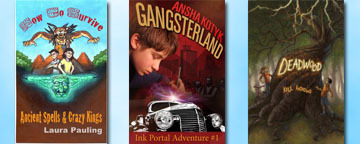
Prize Package Two (signed paperbacks)
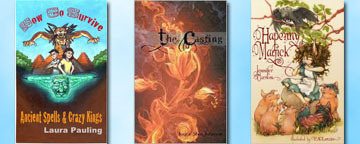
Prize Package Three

Refresh the page if you can't see the Rafflecopter form!
a Rafflecopter giveaway
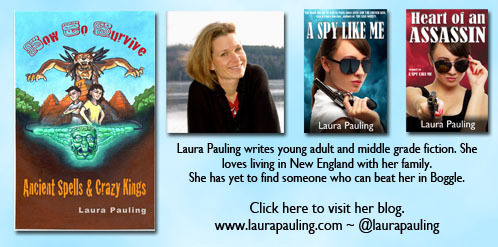


Secondly, and even MORE amazing: we're Stop #5 on Laura Pauling's blog tour for her new release! She's here today to tell you a little bit about her book and how she was able to use her fear while writing it. Oh, and she's got some tasty tidbits up for grabs so don't forget to sign up to win one of her awesome prize packages!


When Bianca and Melvin brave the jungle to rescue their grandfather, they stumble upon the ancient Maya city of Etza, where the people haven’t aged in 2,000 years. They must learn to work together as they face loincloth-wearing skeletons from the underworld, a backstabbing princess, and an ancient prophecy that says in three days the city will be destroyed.
No problem. They’ll find Zeb and zip right out of there. The fact that a crazy king wants to serve Bianca up to the gods as an appetizer is just a minor technicality. But this ancient evil dude has finally met his match.
Using my fears in my writing
We are often told to write what we know. One problem. I’ve never lived with the Ancient Maya and I’ve never visited the temples. I’d love to! Believe me. But I had to rely on research and others’ first hand experiences.
But I did use fear in this story.
When Bianca, the main character, faces the stone of sacrifice and the king who wants to offer her up to the gods, I channeled my fear of squirrels and hornets. Sounds silly but it worked.
Yes, I’m the girl who screams and jerks and runs away at the sight of the brown insects with hanging legs and a buzz that strikes terror in my heart.
Last year, my family was gone. I was home alone and it happened to be the first really warm spring day. So, of course, as usual, a hornet buzzed up in the sky light in my bedroom.
I was by myself. And I had to take care of it because no way would I be able to sleep at night.
I’d like to say that I was brave and killed it with the end of a broomstick like my husband does, but no, I came out with the big guns. Raid. I know. Bad. Chemicals. Emergencies only!
I hovered by the entrance to my room, Raid in hand. The buzzing was constant. I had to do this. But seriously. My legs were shaking. And I realized that shaking legs in extreme fear is not a cliché. It’s very real. I could barely breathe. Sweat broke out all over my body.
I sprayed and down it fell. Except there was more angry buzzing! Meaning there was one half alive on the floor and another one in the window. Two! I started crying because it wasn’t over.
I sprayed the second and smashed them both. Then I crashed, my body weak from the adrenaline rush.
So when I had to write about Bianca facing death, I used my experiences. Okay, I agree. Facing death by having your heart ripped out is not the same as killing two hornets. But it felt like it to me!
Thanks Angela and Becca for having me today!
How To Survive Ancient Spells and Crazy Kings released in November. Pugalicious Press did a fantastic job, and I’m extremely happy with the results. This book would make a fantastic gift for boys or girls who enjoy adventure stories with lots of excitement! You can purchase it on Amazon or Barnes and Noble. You can read the first chapter here.
Thankfully, my journey is just beginning and I’m excited to see where it leads.
Click here for the list of blog tour stops! Enter to win these prize packages!
Prize Package One (signed paperbacks)

Prize Package Two (signed paperbacks)

Prize Package Three

Refresh the page if you can't see the Rafflecopter form!
a Rafflecopter giveaway


Published on December 07, 2012 01:00
December 5, 2012
K.M.Weiland: 10 Lessons From a Completed Novel
I'm honored to have one of my favorite people joining us on the blog today--K.M. Weiland. I think of her as The Queen Of The Outline! She offers her thoughts on all things writing on her blog Word Play and has just released her newest book,
Dreamlander.
BTW, she's also running the BIGGEST & COOLEST contest I've ever seen, so make sure to check it out.
~ ~ ~ ~
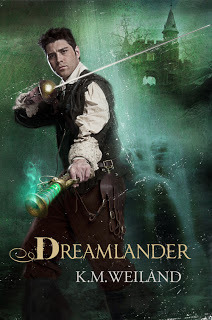
An author can have no greater teacher than his own stories. Every book I write teaches me new lessons about both my craft and my life. Just when I think I’ve got it all figured out, I start a new story, and—bam!—I realize I still have so much to learn.
My journey with my just-released (yay!) fantasy novel Dreamlander was a twelve-year adventure that taught me more than any book I’ve previously written. Joy, sorrow, excitement, frustration, despair, and confidence—it was all there. Now that I stand at the end of that journey, I can look back and identify some of the most important writing lessons I learned. Here are ten:
1. Prepare. Most of us are going to be eager to skip the prep work and get right down to the fun of writing that first draft. But Dreamlander’s sprawling epic of story (which spans two worlds) drove home to me the importance of planning early on. Every writer’s prep work will look a little different; for me, it looks like a detailed outline, which allows me to chart my course safely through the sometimes choppy storytelling waters.
2. Listen. None of us are experts—even when it comes to our own stories. We lose our objectivity somewhere around the first completed page. Sharing our early drafts with knowledgeable and honest beta readers is vital. But, even more than that, we have to be willing to listen to those readers’ advice. Take a little while to let the sting of criticism wear off, then analyze their comments for the truth they will inevitably offer.
3. Persevere. Stories aren’t written in a day, and they’re not edited in a month. You may not need twelve years to bring your story to fruition, like I did, but it’s my opinion that any book is going to need at least a year or two to brew. To truly perfect a story, we have to grow and gain distance from it. During that time, we’re going to be discouraged. We’re going to believe the book will never shed its gray feathers and transform into a swan. But we just have to keep at it. Perseverance conquers the unconquerable.
4. Research. Writers may dwell in the realm of make-believe. But that doesn’t negate our responsibility to the facts. This goes both for research into topical matters (firearms, linguistics, cultures, etc.) and for research into our chosen genres. Don’t just read your genre—study it. Find its clichés, find its opportunities for originality, and use your knowledge to transform your story.
5. Find the magic. Magic is our stock in trade. But sometimes, as we’re slogging through our fifth revision, it can be difficult to remember why we fell in love with this story in the first place. If you find yourself dreading your story, take a break for a while. Take a bit of time to play with it in your head, just for fun, like you did in the days when you first conceived it.
6. Find the conflict. We all know it: no conflict, no story. Dig deep and find the conflict that powers your story. What do your characters want most? What’s keeping them from achieving it? That, right there, is going to be the heart of your conflict. Hit it for all your worth and don’t spare your characters.
7. Find the theme. Once you’ve found your conflict, you’ll be able to catch a glimpse of the arc your protagonist will take over the course of your story. Once you’ve found the arc, you’ll be able to identify the demons your character will have to overcome. And once you’ve identified those demons, you will have found your theme.
8. Be patient. Sometimes getting to know characters takes time. Sometimes getting all the plot points right takes tries and retries. Realize that and stave off discouragement. View every word written, every word deleted, and every word revised as one tiny step that’s carrying you closer to your end goal of perfection. You don’t have to get everything right the first time. You just have to get it right the last time.
9. Be humble. Writing is tough on egos. We usually react in one of two ways. We either cave beneath criticism and fall into crippling depression. Or we figure we know it all and brush off all other opinions. Both are wrongheaded approaches. Always stay open to learning about your own shortcomings. Don’t box yourself into the prison of thinking you have it all figured out.
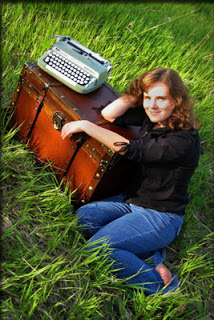
10. Be fearless. By the same token as the above, don’t let your own imperfections get you down. The only writers who succeed are those who dare much. Throw everything you’ve got onto the page. Acknowledge your fears about your level of talent and people’s perception of your work—and then face them fearlessly.
In the spirit of #9, I’ll tell you right off that these lessons are all WIPs in my own life. I suspect I’ll still be learning some of them after writing my fiftieth book. But, thanks to Dreamlander, and all the books that have gone before, I’ve learned a little more about myself and the writing life—and I’m ready to apply all those lessons to the next adventure!
K.M. Weiland is the author of the epic fantasy Dreamlander , the historical western A Man Called Outlaw and the medieval epic Behold the Dawn . She enjoys mentoring other authors through her writing tips, her book Outlining Your Novel: Map Your Way to Success , and her instructional CD Conquering Writer’s Block and Summoning Inspiration.
Also, if you are looking for a FEEL GOOD Pay-it-forward type event that is easy to do, please check out our OPERATION: HELP THE ELF! Help us spread some Christmas Cheer among writers!

~ ~ ~ ~

An author can have no greater teacher than his own stories. Every book I write teaches me new lessons about both my craft and my life. Just when I think I’ve got it all figured out, I start a new story, and—bam!—I realize I still have so much to learn.
My journey with my just-released (yay!) fantasy novel Dreamlander was a twelve-year adventure that taught me more than any book I’ve previously written. Joy, sorrow, excitement, frustration, despair, and confidence—it was all there. Now that I stand at the end of that journey, I can look back and identify some of the most important writing lessons I learned. Here are ten:
1. Prepare. Most of us are going to be eager to skip the prep work and get right down to the fun of writing that first draft. But Dreamlander’s sprawling epic of story (which spans two worlds) drove home to me the importance of planning early on. Every writer’s prep work will look a little different; for me, it looks like a detailed outline, which allows me to chart my course safely through the sometimes choppy storytelling waters.
2. Listen. None of us are experts—even when it comes to our own stories. We lose our objectivity somewhere around the first completed page. Sharing our early drafts with knowledgeable and honest beta readers is vital. But, even more than that, we have to be willing to listen to those readers’ advice. Take a little while to let the sting of criticism wear off, then analyze their comments for the truth they will inevitably offer.
3. Persevere. Stories aren’t written in a day, and they’re not edited in a month. You may not need twelve years to bring your story to fruition, like I did, but it’s my opinion that any book is going to need at least a year or two to brew. To truly perfect a story, we have to grow and gain distance from it. During that time, we’re going to be discouraged. We’re going to believe the book will never shed its gray feathers and transform into a swan. But we just have to keep at it. Perseverance conquers the unconquerable.
4. Research. Writers may dwell in the realm of make-believe. But that doesn’t negate our responsibility to the facts. This goes both for research into topical matters (firearms, linguistics, cultures, etc.) and for research into our chosen genres. Don’t just read your genre—study it. Find its clichés, find its opportunities for originality, and use your knowledge to transform your story.
5. Find the magic. Magic is our stock in trade. But sometimes, as we’re slogging through our fifth revision, it can be difficult to remember why we fell in love with this story in the first place. If you find yourself dreading your story, take a break for a while. Take a bit of time to play with it in your head, just for fun, like you did in the days when you first conceived it.
6. Find the conflict. We all know it: no conflict, no story. Dig deep and find the conflict that powers your story. What do your characters want most? What’s keeping them from achieving it? That, right there, is going to be the heart of your conflict. Hit it for all your worth and don’t spare your characters.
7. Find the theme. Once you’ve found your conflict, you’ll be able to catch a glimpse of the arc your protagonist will take over the course of your story. Once you’ve found the arc, you’ll be able to identify the demons your character will have to overcome. And once you’ve identified those demons, you will have found your theme.
8. Be patient. Sometimes getting to know characters takes time. Sometimes getting all the plot points right takes tries and retries. Realize that and stave off discouragement. View every word written, every word deleted, and every word revised as one tiny step that’s carrying you closer to your end goal of perfection. You don’t have to get everything right the first time. You just have to get it right the last time.
9. Be humble. Writing is tough on egos. We usually react in one of two ways. We either cave beneath criticism and fall into crippling depression. Or we figure we know it all and brush off all other opinions. Both are wrongheaded approaches. Always stay open to learning about your own shortcomings. Don’t box yourself into the prison of thinking you have it all figured out.

10. Be fearless. By the same token as the above, don’t let your own imperfections get you down. The only writers who succeed are those who dare much. Throw everything you’ve got onto the page. Acknowledge your fears about your level of talent and people’s perception of your work—and then face them fearlessly.
In the spirit of #9, I’ll tell you right off that these lessons are all WIPs in my own life. I suspect I’ll still be learning some of them after writing my fiftieth book. But, thanks to Dreamlander, and all the books that have gone before, I’ve learned a little more about myself and the writing life—and I’m ready to apply all those lessons to the next adventure!
K.M. Weiland is the author of the epic fantasy Dreamlander , the historical western A Man Called Outlaw and the medieval epic Behold the Dawn . She enjoys mentoring other authors through her writing tips, her book Outlining Your Novel: Map Your Way to Success , and her instructional CD Conquering Writer’s Block and Summoning Inspiration.
Also, if you are looking for a FEEL GOOD Pay-it-forward type event that is easy to do, please check out our OPERATION: HELP THE ELF! Help us spread some Christmas Cheer among writers!

Published on December 05, 2012 03:30
December 3, 2012
OPERATION: HELP THE ELF!
Oh No!
Pete the Elf had one too many eggnogs at the Santa’s Workshop Christmas Bash and as he wobbled home, he dropped Santa’s Naughty & Nice List. As luck would have it, he managed to collect the Naughty List before the North wind blew in, but the Nice list scattered in its wake.

If Pete doesn’t recover Santa’s Nice List in time, he could be out of a job! We can’t let that happen--he has a wife, a pet hamster and six elf-lets to feed!
Will you help?
If you think you know someone (a writer, book blogger, critique partner or good friend) who should be on Santa’s Nice List this year, please fill out this simple form below. On December 19th, all of us will help Pete keep his job by spreading cheer for him through small gifts of ebooks, free ecards or other small kindnesses. Hopefully Santa will be none the wiser!
Will you join us on this secret mission to supply the missing NICE LIST?
If so, fill out this form for OPERATION: HELP THE ELF! and if you like, add your blog to the linky list below. If you don’t have a blog, no worries! You can still participate :)

My name is in this book!
Becca and I are committed to making sure Pete saves Christmas. Please join us! We have a small gift for all participants, but even better, YA author Marilee Brothers is offering up AN AMAZING PRIZE: the chance to be named after a character in her next book!
I won this honor a few years ago, and what a thrill! ---->
Let’s spread some joy to someone we've met online and let them know how special they are!
(Do you know someone else who might wish to participate in the fun, too? We appreciate your tweets or if you want to post about this event, just snag our HELP THE ELF blog badge and link to this post so others can sign up! Let's make this the biggest, best event ever!)
PLEASE NOTE: With the linky tool, put your name & blog URL if you have one, not the person you will choose to surprise with a gift or card. We want this to stay a nice surprise for them on the 19th. The linky tool will allow visitors to check our YOUR blog to see which writing friend you feature! :)
***** Don't forget to fill out the form ABOVE so I can email you more details!


Pete the Elf had one too many eggnogs at the Santa’s Workshop Christmas Bash and as he wobbled home, he dropped Santa’s Naughty & Nice List. As luck would have it, he managed to collect the Naughty List before the North wind blew in, but the Nice list scattered in its wake.

If Pete doesn’t recover Santa’s Nice List in time, he could be out of a job! We can’t let that happen--he has a wife, a pet hamster and six elf-lets to feed!
Will you help?
If you think you know someone (a writer, book blogger, critique partner or good friend) who should be on Santa’s Nice List this year, please fill out this simple form below. On December 19th, all of us will help Pete keep his job by spreading cheer for him through small gifts of ebooks, free ecards or other small kindnesses. Hopefully Santa will be none the wiser!
Will you join us on this secret mission to supply the missing NICE LIST?
If so, fill out this form for OPERATION: HELP THE ELF! and if you like, add your blog to the linky list below. If you don’t have a blog, no worries! You can still participate :)

My name is in this book!
Becca and I are committed to making sure Pete saves Christmas. Please join us! We have a small gift for all participants, but even better, YA author Marilee Brothers is offering up AN AMAZING PRIZE: the chance to be named after a character in her next book!
I won this honor a few years ago, and what a thrill! ---->
Let’s spread some joy to someone we've met online and let them know how special they are!
(Do you know someone else who might wish to participate in the fun, too? We appreciate your tweets or if you want to post about this event, just snag our HELP THE ELF blog badge and link to this post so others can sign up! Let's make this the biggest, best event ever!)
PLEASE NOTE: With the linky tool, put your name & blog URL if you have one, not the person you will choose to surprise with a gift or card. We want this to stay a nice surprise for them on the 19th. The linky tool will allow visitors to check our YOUR blog to see which writing friend you feature! :)
***** Don't forget to fill out the form ABOVE so I can email you more details!

Published on December 03, 2012 04:00
November 30, 2012
A Fun Event, A Thank You & The Next Thesaurus Book
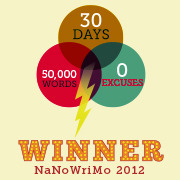
LIKE A BOSS.
Wow, November is over. What a ride! Despite many, many November mishaps (our blog feed exploding, Amazon pulling our book by accident, family illnesses and more) I did pull off my 50K and officially barely scraped past the finish line killed Nanowrimo. Woot! I know today, a ton of NANO folks are breathing a collective sigh of relief that life is going to get back to normal.
And of course, there were many crazy happenings on the blog here as well! People all over the world reported odd sighting of well, ME, doing strange things.
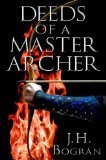

If you missed it (you know, because you were eating, breathing and sleeping 50K worth of words), Jessica Bell caught me Dancing With The Stars, Nicōle Olea Discovered I was raising Elvis from the dead,
Very strange, I say. After all, I was writing my new Nano novel! How could I do all those things?
*wink*
Big Fat Squishy Thanks
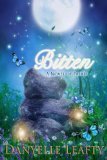

Huge thanks to all these awesome folks who helped make it a fun November while I was in my writing cave. And a super big bacon-glazed thank you to AMBER WEST, the master of photoshop, who helped with all those great pics. Each one had me howling, I swear!
Throughout this post you'll see some book covers, just a few of the offerings from these talented authors. I hope you'll check them out if you're looking for a new read!
The Next Thesaurus Book
Now, some big news! I know many of you who have The Emotion Thesaurus book have been patiently waiting to see which Thesaurus Becca and I would tackle next. We've finally decided to let the cat out of the bag. And guess what? We're releasing a PAIR of books!
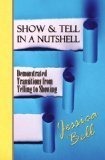

Right now, Becca and I are hard at work on 2 books centering on Character Traits. Because this is such a massive topic, we needed a way to split it into two books in order to keep printing costs down. So, the new books will each cover a side of Character Traits. One will tackle Character Flaws while the other will take on a Character's Positive Attributes. We hope these books will help you create strong, unique (yet flawed) characters that will leap off the page. Becca and I are aiming for a summer release.
Got Body Language? Meet Becca in Person!
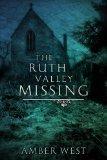
 And speaking of books, and Becca...did you know she will be offering a workshop at the 2013 Miami SCBWI-FL conference? So if you live in the area and are attending, mark her workshop down, because Becca really, really knows her nonverbal communication. You'll learn how to better show Emotion through your character's body language and more. There are many great speakers like Bruce Coville and Ellen Hopkins and it looks to be a really great event. Ah! I wish I lived closer so I could go.
And speaking of books, and Becca...did you know she will be offering a workshop at the 2013 Miami SCBWI-FL conference? So if you live in the area and are attending, mark her workshop down, because Becca really, really knows her nonverbal communication. You'll learn how to better show Emotion through your character's body language and more. There are many great speakers like Bruce Coville and Ellen Hopkins and it looks to be a really great event. Ah! I wish I lived closer so I could go. Liked Random Acts Of Kindness For Writers? Stay Tuned...
We have something super fun planned for December that we would love, love, love you to participate in. Our next post on MONDAY, Dec 3rd will give out ALL the details, so please stop in and if you like, sign up. We are looking to spread some holiday cheer and hope you will too!
The Process From Blog To Book
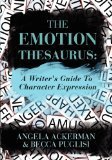

Today Becca is over at Nina Amir's blog talking about the process of how we took our Emotion Thesaurus and expanded it into a book. This is something we are seeing more and more bloggers trying, so if you are interested in doing something like this yourself, please check it out! Make sure to poke around Nina's blog as well, because it is a wealth of information on blogging and how to go from blog to book. Really great stuff.
Okay, whew! This was quite the update--lots of things happening, and more to come. I hope everyone is looking ahead to December with as much joy and good cheer as I am. Becca and I both feel blessed to know so many wonderful people online, and we are sending vibes to every one of you for a wonderful December, and an even more amazing 2013!

Published on November 30, 2012 22:25
November 29, 2012
NaNoWriMo: Angela, a Hero or Villain? You Decide!
Seeing as we're only days away from wrapping up Nano, I was hoping that there would be an end to Angela's crazy antics, but today, another email hit our Bookshelf Muse inbox! This one comes from Danyelle Leafty, MG & YA Fantasy author and blogger at Myth-Takes.

Danyelle is well known in the writing community, blogs for Query Tracker and helps facilitate MGLitChat on Twitter. So trust me when I say that I fully believe the following letter is not a hoax. Please read on to find out what Angela's done THIS TIME.
Subject: Super Hero Unmasked!
Dear Angela,
So, there’s been talk. Talk that maybe—just maybe—you aren’t exactly doing what we think you’re doing. You know? Burning up brain cells to get out 50 thousand words in one month. NaNoing. That.
At first, I couldn’t believe it. If Angela says she’s NaNoing, then she’s NaNoing. Right? But then, something happened. My characters were all on strike, something about demanding better working conditions, so I decided to do some serious people watching.
The Big City is the best place to do this, and I’m so glad I went because there’s something you need to know. Your cover’s been blown!
You know after that Incident—the one with the guy freezing everyone to the ceiling and trying to reconfigure their neural circuitry, not the one involving the purple fire, chocolate sundaes, and bricks—when the people who had saved us all stood up to accept our undying gratitude and thanks?
Well, I don’t know how to say this, so I’m just going to spit it out.
Ready?
Okay.
Your mask slipped. It just disappeared—went poof!
You would have gotten away clean if it hadn’t been for the left over chocolate on your mask. (And wow! I knew Toadman had a thing for chocolate, but I never knew his tongue could stretch that far.)
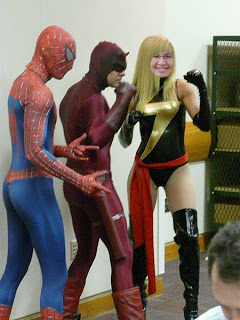
Original by Piotrus @ Wiki Commons
Anyway, I’m sending you the only evidence I’ve been able to round up. Some passerby snapped your photo just as Toadman stole your mask. Don’t worry though. I’ve burned the memory card and that particular cell phone is now sleeping with the fishes.
On the other hand, you might want to have a new alter ego on hand. Just in case. Because I’m pretty sure I wasn’t the only one who saw your face . . .
~D
PS: Just wanted to give you a heads up that you might get a call from someone named Todd inquiring about either your cousin or his phone. Since you’re the super hero here, I’ll let you handle this. O:)
Masks? Frogman? After Angela's stint on Dancing With The Stars, raising Elvis from the dead, terrorizing the Canadian countryside as a zombie, and raising her Alien legion of Bugites, I really, REALLY didn't think things could get any weirder. But it really does appear that Angela...just might be...Ms. Marvel.
I don't know, perhaps all this insanity is getting to me, but a teeny-tiny piece still believes there must be a logic explanation. That, despite a Grand Canyon-sized CRATER of evidence, she is (maybe?) doing Nanowrimo and this is all a crazy mistake. As always, I turn to you, Musers. Please help me puzzle this out by TAKING THE POLL.
Weigh in! Is Angela the Biggest Fraud in history, or...
Also, a FINAL REMINDER to enter our NANOWRIMO PARTICIPANT DRAW! Tell your nano friends! Tell your Nano family! Tell Elvis if you see him! Please encourage all the people you know in the NANOWRIMO CHALLENGE to enter our draw for one of 10 Emotion Thesaurus Ebooks! Your sharing & tweets are appreciated!


Danyelle is well known in the writing community, blogs for Query Tracker and helps facilitate MGLitChat on Twitter. So trust me when I say that I fully believe the following letter is not a hoax. Please read on to find out what Angela's done THIS TIME.
Subject: Super Hero Unmasked!
Dear Angela,
So, there’s been talk. Talk that maybe—just maybe—you aren’t exactly doing what we think you’re doing. You know? Burning up brain cells to get out 50 thousand words in one month. NaNoing. That.
At first, I couldn’t believe it. If Angela says she’s NaNoing, then she’s NaNoing. Right? But then, something happened. My characters were all on strike, something about demanding better working conditions, so I decided to do some serious people watching.
The Big City is the best place to do this, and I’m so glad I went because there’s something you need to know. Your cover’s been blown!
You know after that Incident—the one with the guy freezing everyone to the ceiling and trying to reconfigure their neural circuitry, not the one involving the purple fire, chocolate sundaes, and bricks—when the people who had saved us all stood up to accept our undying gratitude and thanks?
Well, I don’t know how to say this, so I’m just going to spit it out.
Ready?
Okay.
Your mask slipped. It just disappeared—went poof!
You would have gotten away clean if it hadn’t been for the left over chocolate on your mask. (And wow! I knew Toadman had a thing for chocolate, but I never knew his tongue could stretch that far.)

Original by Piotrus @ Wiki Commons
Anyway, I’m sending you the only evidence I’ve been able to round up. Some passerby snapped your photo just as Toadman stole your mask. Don’t worry though. I’ve burned the memory card and that particular cell phone is now sleeping with the fishes.
On the other hand, you might want to have a new alter ego on hand. Just in case. Because I’m pretty sure I wasn’t the only one who saw your face . . .
~D
PS: Just wanted to give you a heads up that you might get a call from someone named Todd inquiring about either your cousin or his phone. Since you’re the super hero here, I’ll let you handle this. O:)
Masks? Frogman? After Angela's stint on Dancing With The Stars, raising Elvis from the dead, terrorizing the Canadian countryside as a zombie, and raising her Alien legion of Bugites, I really, REALLY didn't think things could get any weirder. But it really does appear that Angela...just might be...Ms. Marvel.
I don't know, perhaps all this insanity is getting to me, but a teeny-tiny piece still believes there must be a logic explanation. That, despite a Grand Canyon-sized CRATER of evidence, she is (maybe?) doing Nanowrimo and this is all a crazy mistake. As always, I turn to you, Musers. Please help me puzzle this out by TAKING THE POLL.
Weigh in! Is Angela the Biggest Fraud in history, or...
Also, a FINAL REMINDER to enter our NANOWRIMO PARTICIPANT DRAW! Tell your nano friends! Tell your Nano family! Tell Elvis if you see him! Please encourage all the people you know in the NANOWRIMO CHALLENGE to enter our draw for one of 10 Emotion Thesaurus Ebooks! Your sharing & tweets are appreciated!

Published on November 29, 2012 03:30
Writers Helping Writers
A place for writers to find support, helpful articles on writing craft, and an array of unique (and free!) writing tools you can't find elsewhere. We are known far and wide for our "Descriptive Thesau
A place for writers to find support, helpful articles on writing craft, and an array of unique (and free!) writing tools you can't find elsewhere. We are known far and wide for our "Descriptive Thesaurus Collections" which help authors create vivid imagery and sensory detail for their Settings, Characters (physical descriptions, emotions, skills & talents, etc.), Symbolism, Weather, and a whole bunch more. Stop in and say hello! :) http://writershelpingwriters.net/
...more
- Angela Ackerman's profile
- 1023 followers



